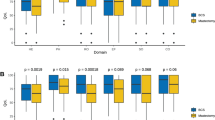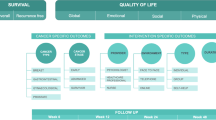Abstract
This study explored psychosocial predictors of relapse and survival in early stage melanoma patients. Patients with locoregional melanoma whose tumour thickness exceeded 0.69 mm, seen at the Sydney Melanoma Unit between 1991 and 1996 participated in the study. Questionnaires were sent to participating patients every 3 months for 2 years. Domains measured included cognitive appraisal of threat, coping, psychological adjustment, quality of life and perceived aim of treatment. Disease and demographic data were obtained from medical records. Multivariate analyses from baseline data used the Cox proportional hazards model. Of the 682 patients invited to participate 426 (62%) agreed. 91 (21%) relapsed and 60 (14%) died within the follow-up period, that ended in October 1997. After controlling for known prognostic indicators, several psychosocial variables predicted time to relapse and/or survival duration. Patients who perceived their aim of treatment to be cured, who did not use avoidance as a coping strategy or who were concerned about their disease experienced longer periods without relapse. Shorter survival duration was associated with a positive mood, the use of avoidance as a coping strategy, not being concerned with their disease and concern about the impact of the disease on family. There is still much to learn about the potential relationships between psychological well being, human behaviours and cancer outcome. Research in this area needs to clarify the psychological processes, as well as understand the biological and/or behavioural mechanisms that may link them to outcome. © 2000 Cancer Research Campaign http://www.bjcancer.com
Similar content being viewed by others
Article PDF
Change history
16 November 2011
This paper was modified 12 months after initial publication to switch to Creative Commons licence terms, as noted at publication
References
Bernhard J, Hurny C, Coates AS, Peterson HF, Castiglione-Gertsch M, Gelber RD, Goldhirsch A, Senn HJ and Rudenstam CM (1997 Quality of life assessment in patients receiving adjuvant therapy for breast cancer: the IBCSG approach. The International Breast Cancer Study Group [published erratum appears in Ann Oncol 1998 Feb9(2):231]. Annals of Oncology 8: 825–835
Buddeberg C, Sieber M, Wolf C, Landolt-Ritter C, Richter D and Steiner R (1996 Are coping strategies related to disease outcome in early breast cancer? [see comments]. Journal of Psychosomatic Research 40: 255–264
Brown JE, King MT, Buton PN, Dunn SM and Coates AS (2000 Patterns over time in quality of life, coping and pyschological adjustment in late stage melanoma patients: An application of multilevel models. Quality of Life Research 9: 75–85
Butow P, Coates A, Dunn S, Bernhard J and Hurny C (1991 On the receiving end. IV: Validation of quality of life indicators. Annals of Oncology 2: 597–603
Butow PN, Coates AS and Dunn SM (1999 Psychosocial predictors of survival in metastatic melanoma. Journal of Clinical Oncology 17: 2256–2263
Cassileth BR, Walsh WP and Lusk EJ (1988 Psychological correlates of cancer survival: A subsequent report 3 to 8 years after cancer diagnosis. Journal of Clinical Oncology 6: 1753–1759
Ciampi A, Lawless J, McKinney S and Singhal K (1988 Regression and recursive partition strategies in the analysis of medical survival data. Journal of Clinical Epidemiology 41: 737–748
Cohn-Cedermark G, Mansson-Brahme E, Rutqvist LE, Larsson O, Singnomklao T and Ringborg U (1999 Metastatic patterns, clinical outcome, and malignant phenotype in malignant cutaneous melanoma. Acta Oncologica 38: 549–557
Dean C and Surtees PG (1989 Do psychological factors predict survival in breast cancer?. Journal of Psychosomatic Research 33: 361–369
Dunn SM, Patterson P, Butow PN, Smartt HH, McCarthy WH and Tattersall MH (1993 Cancer by another name: a randomised trial of the effects of euphemism and uncertainty in communicating with cancer patients. Journal of Clinical Oncology 11: 989–996
Dunn SM, Welch GW, Butow PN and Coates AS (1997 Refining the measurement of psychological adjustment in cancer. Australian Journal of Psychology 49: 144–151
Faller H, Bulzebruck H, Drings P and Lang H (1999 Coping, distress, and survival among patients with lung cancer. Archives of General Psychiatry 56: 756–762
Fawzy FI, Fawzy NW, Hyun CS, Elashoff R, Guthrie D, Fahey JL and Morton DL (1993 Malignant melanoma. Effects of an early structured psychiatric intervention, coping and affective state on recurrence and survival 6 years later. Archives of General Psychiatry 50: 681–689
Folkman S (1986 Dynamics of a stressful encounter: Cognitive appraisal, coping, and encounter outcomes. Journal of Personality and Social Psychology 50: 992–1003
Gebski A, Leung O, McNeil D and Lunn D (1992). SPIDA Users Manual, Statistical Computing Laboratory Pty Ltd: Sydney
Giraldi T, Rodani MG, Cartei G and Grassi L (1997 Psychosocial factors and breast cancer: a 6-year Italian follow-up study. Psychotherapy and Psychosomatics 66: 229–236
Greer S, Morris T, Pettingale KW and Haybittle JL (1990 Psychological response to breast cancer and 15-year outcome [letter]. Lancet 335: 49–50
Heim E, Valach L and Schaffner L (1997 Coping and psychosocial adaptation: Longitudinal effects over time and stages in breast cancer. Psychosomatic Medicine 59: 408–418
Hurny C, Bernhard J and Bacchi M (1993 The perceived adjustment to chronic illness scale (PACIS): A global indicator of coping for operable breast cancer patients in clinical trials. Swiss Group for Clinical Cancer Research (SAKK) and the International Breast Cancer Study Group (IBCSG). Supportive Care in Cancer 1: 200–208
Jamison R, Burish T and Wallston K (1987 Psychogenic factors in predicting survival of breast cancer patients. Journal of Clinical Oncology 5: 768–772
Lawless J and Singhal K (1978 Efficient screening of nonnormal regression models. Biometrics 34: 318–327
Millar E, Cappelen-Smith C, Sarris M, Clarke R, Kearsley J and Lee C (1998 Prognostic factors in cutaneous malignant melanoma. Cancer Forum 22: 178–180
Molassiotis A, Van Den Akker OB, Milligan DW and Goldman JM (1997 Symptom distress, coping style and biological variables as predictors of survival after bone marrow transplantation. Journal of Psychosomatic Research 42: 275–285
Mulder CL, Van Der Pompe G, Spiegel D, Antoni MH and De Vries MJ (1992 Do psychosocial factors influence the course of breast cancer? A review of recent literature, methodological problems and future directions. Psycho-Oncology 1: 155–167
Priestman TJ and Baum M (1976 Evaluation of quality of life in patients receiving treatment for advanced breast cancer. Lancet 1: 899–900
Rogentine GN Jr, van Kammen DP, Fox BH, Docherty JP, Rosenblatt JE, Boyd SC and Bunney WE Jr (1979 Psychological factors in the prognosis of malignant melanoma: a prospective study. Psychosomatic Medicine 41: 647–655
Spiegel D, Bloom JR, Kraemer HC and Gottheil E (1989 Effect of psychosocial treatment on survival of patients with metastatic breast cancer. Lancet ii: 888–891
Stavraky K, Donner A, Kincade J and MA S (1988 The effect of psychosocial factors on lung cancer mortality at one year. Journal of Clinical Epidemiology 41: 75–82
Tross S, Herndon J 2nd, Korzun A, Kornblith AB, Cella DF, Holland JF, Raich P, Johnson A, Kiang DT, Perloff M, Norton L, Wood W and Holland JC (1996 Psychological symptoms and disease-free and overall survival in women with stage II breast cancer. Cancer and Leukemia Group B [see comments]. Journal of the National Cancer Institute 88: 661–667
Watson M, Haviland J, Greer S, Davidson J and Bliss JM (1999 Influence of psychological response on survival in breast cancer: a population-based cohort study. Lancet 354: 1331–1336
Weisman A and Worden J (1976–77 The existential plight in cancer: significance of the first 100 days. International Journal of Psychiatry in Medicine 7: 1–15
Author information
Authors and Affiliations
Rights and permissions
From twelve months after its original publication, this work is licensed under the Creative Commons Attribution-NonCommercial-Share Alike 3.0 Unported License. To view a copy of this license, visit http://creativecommons.org/licenses/by-nc-sa/3.0/
About this article
Cite this article
Brown, J., Butow, P., Culjak, G. et al. Psychosocial predictors of outcome: time to relapse and survival in patients with early stage melanoma. Br J Cancer 83, 1448–1453 (2000). https://doi.org/10.1054/bjoc.2000.1471
Received:
Accepted:
Published:
Issue Date:
DOI: https://doi.org/10.1054/bjoc.2000.1471
Keywords
This article is cited by
-
Coping and vegetative reactivity in uveal melanoma
Spektrum der Augenheilkunde (2023)
-
Early quality-of-life and psychological predictors of disease-free time and survival in localized prostate cancer
Quality of Life Research (2019)
-
Comparison of quality of life among long-term melanoma survivors and non-melanoma controls: a cross-sectional study
Quality of Life Research (2017)
-
Helplessness/hopelessness, minimization and optimism predict survival in women with invasive ovarian cancer: a role for targeted support during initial treatment decision-making?
Supportive Care in Cancer (2016)
-
Effects of psycho-behavioral interventions on immune functioning in cancer patients: a systematic review
Journal of Cancer Research and Clinical Oncology (2014)



